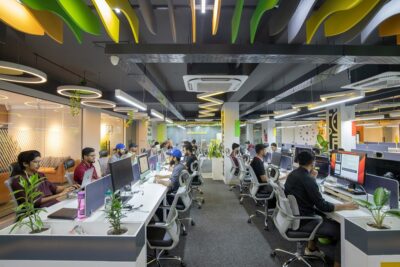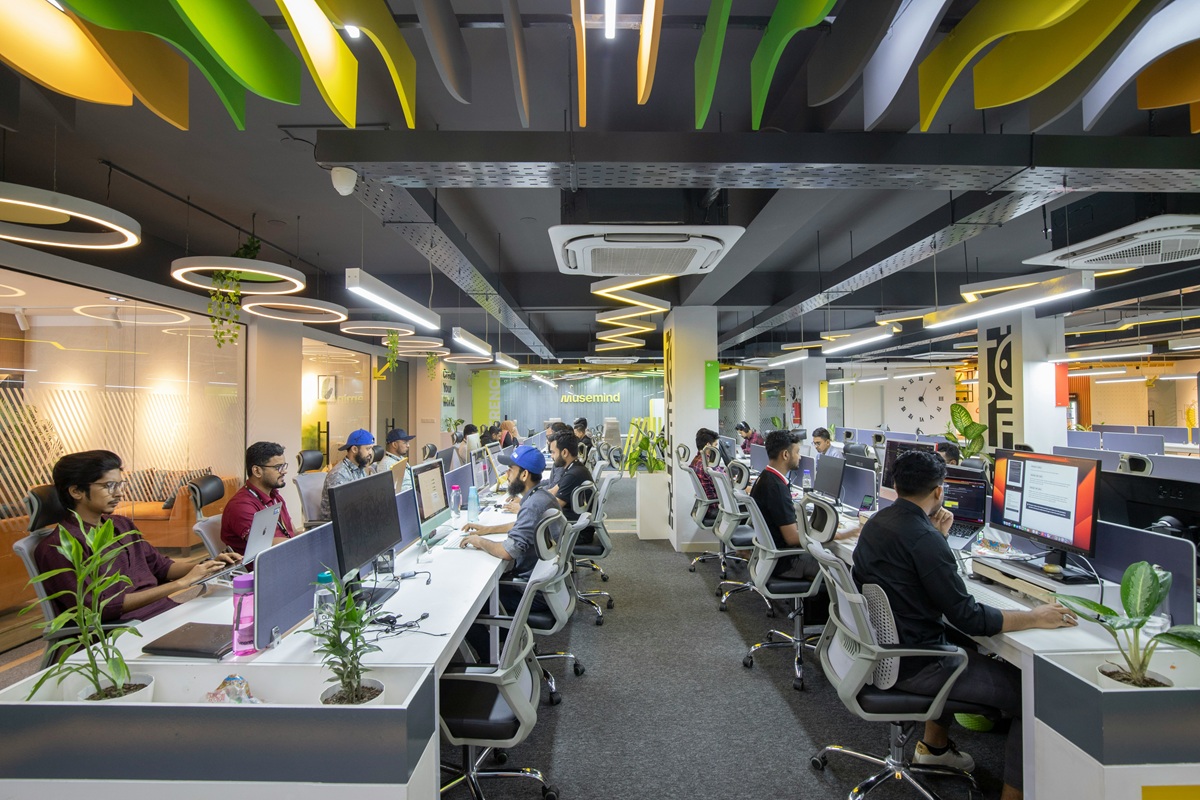Gen Z Is Changing the Workplace — Companies That Don’t Adapt Will Struggle to Keep Talent The workplace is transforming fast, and Generation Z—born b
Gen Z Is Changing the Workplace — Companies That Don’t Adapt Will Struggle to Keep Talent
The workplace is transforming fast, and Generation Z—born between 1997 and 2012—is leading the charge. Unlike previous generations, they’re not content to follow the traditional path of college, corporate job, and climbing the ladder. They want flexibility, purpose, and individuality, and companies that fail to evolve risk losing out on this influential talent pool.Gen Z Is Changing the Workplace.

Key Takeaways on how Gen Z Is Changing the Workplace
- Gen Z leans toward entrepreneurship, freelancing, remote work, and trades over rigid 9-to-5 roles.
- They demand work-life balance, autonomy, and meaningful careers.
- Companies must offer flexible schedules, hybrid models, and value-driven cultures to attract and retain them.
Why Gen Z Sees Work Differently
Older generations often saw success as linear: earn a degree, get a steady job, and work your way up. Gen Z is rewriting that story. They’re embracing side hustles, gig work, remote opportunities, and trade skills as legitimate—and often preferred—career paths. They’re unafraid to reject outdated systems like costly degrees or rigid hierarchies if they don’t align with their values.
This generation has shifted the balance of power. With digital platforms, global networks, and accessible freelance work, they know they can create opportunities for themselves. For them, a corporate job is an option, not a necessity.
The Entrepreneurial Generation
Gen Z is incredibly entrepreneurial. Studies show nearly half aspire to launch their own business. Social media platforms like TikTok and Instagram make it easier than ever to create brands, build audiences, and monetize creativity.
To Gen Z, work should complement life—not consume it. They value financial freedom, flexibility, and personal fulfillment more than job titles or long-term loyalty. For many, side hustles often become primary income streams, showing how they prioritize adaptability and independence.
Rediscovering Skilled Trades
Another surprising trend? A return to trades and vocational careers. Enrollment in trade programs—from plumbing to electrical work—has grown significantly. These careers offer practical skills, stability, and entrepreneurial potential without the heavy debt of a four-year degree, which often exceeds $29,000.
Social platforms have played a big role here, too. Tradespeople are sharing their work online, turning craftsmanship into content and proving these jobs can be lucrative and fulfilling. What was once considered old-fashioned is now viewed as skilled, creative, and future-ready.
How Companies Can Win with Gen Z
To keep pace, businesses must rethink leadership and workplace culture:
- Celebrate individuality – Understand each employee’s goals and strengths. Cookie-cutter management doesn’t work anymore.
- Flexibility is essential – Remote work, flexible schedules, and hybrid models are baseline expectations, not perks.
- Purpose over profit – They want to make a difference. Companies that focus on sustainability, inclusivity, and social impact stand out.
What’s Next for the Workforce
Some of these trends may shift over time. Trade professions might become crowded, and gig work could face tighter regulations. But one thing is certain: Gen Z is not waiting for change—they’re driving it. They want work that feels authentic, balanced, and fulfilling.
For organizations, the message is clear: adapting to this mindset is no longer optional. Gen Z influences not just workplaces but also brands and markets. Companies that respect their values, embrace flexibility, and support growth will thrive in this new era.
Gen Z at Work: How a New Generation is Transforming the Employee Experience
Generation Z, born roughly between the late 1990s and early 2010s, is reshaping today’s workplaces with bold ideas and fresh expectations. This group of young professionals is often in the spotlight for valuing wellness and work-life balance over big paychecks, and for challenging traditional management practices. Their mindset is pushing companies to rethink outdated corporate norms, sparking tension but also innovation. This article explores four major themes that define Gen Z’s influence: flexibility, technology, well-being, and customized benefits—and why employers must pay attention if they want to attract and keep this emerging talent.
Flexibility: The New Currency of Engagement
For Gen Z, flexibility isn’t a perk—it’s a requirement. Their work attitudes have been shaped by events like the 2008 financial crash, the explosion of digital technology, and the remote-work boom during COVID-19. These experiences created a generation that expects balance and options, not rigid schedules. They are less interested in the old “climb the ladder at all costs” mentality and more focused on meaningful work that fits into a healthy lifestyle.
Data backs this up. Deloitte’s 2024 Global Gen Z and Millennial Survey shows that work-life balance is the top factor for young employees when choosing an employer. While pay still matters, they are more willing to trade higher salaries for jobs that offer purpose, autonomy, and mental health support. This demand is reshaping workplaces: hybrid models and flexible hours are no longer fringe benefits but essentials. New UK legislation (April 2024) even strengthens employees’ rights to request flexible arrangements, further reinforcing this cultural shift.
Interestingly, these changes benefit not just Gen Z but all employees, especially women and caregivers who cite lack of flexibility as a major reason for job changes. To stay competitive, companies need to design policies that accommodate remote work, part-time options, and output-based performance metrics.
Tech-Savvy and Always Connected
As true digital natives, Gen Z expects smooth, mobile-first interactions at work. They grew up with smartphones and social media, so outdated systems feel like obstacles. They want apps, platforms, and tools that allow quick communication, instant access to resources, and collaborative work without friction.
Employers who want to engage this group must prioritize intuitive, mobile-friendly technology—think integrated messaging, cloud platforms, and AI tools that reduce repetitive tasks. Incorporating social-media-style elements like short videos for internal updates can also improve engagement. Essentially, workplaces need to mirror the fast, interactive, tech-driven world Gen Z is used to.
Well-Being: Beyond Free Coffee and Gym Passes
Unlike previous generations, Gen Z is unapologetic about prioritizing mental and physical health. They actively push back against burnout culture. Yet, stress and anxiety remain common—Deloitte’s 2024 survey found that while 51% rate their mental health positively, 40% feel stressed most of the time. Rising living costs, student loans, heavy workloads, and lack of recognition add to the pressure.
Social media makes this more complex. It’s both a stressor—amplifying comparison and anxiety—and a lifeline, offering online support communities and wellness resources. Remote and hybrid work, while preferred, can also create feelings of isolation; studies show 45% of Gen Z employees reported loneliness in 2023.
For employers, this is a call to action. Beyond offering flexibility, companies must build support systems: confidential counseling, mindfulness programs, mental health days, and opportunities for social connection, whether through in-person meetups or casual online events.
Benefits That Fit Real Lives- Gen Z Is Changing the Workplace
Traditional benefits packages are losing appeal. Gen Z wants personalization. A gym pass might excite one employee; another might prefer student loan repayment help or streaming service discounts. They value perks that reflect their unique interests and lifestyles. Mental health apps, career development stipends, and financial coaching are becoming equally important.
By tailoring benefits, companies can stand out and build loyalty. It’s no longer about throwing money at the problem but showing you understand your people’s needs.
Final Thoughts on how Gen Z Is Changing the Workplace
Gen Z is not just another workforce cohort—they’re catalysts for change. Their push for flexibility, tech integration, mental health focus, and personalized rewards is setting new standards for the modern workplace. Companies that embrace these shifts will not only attract this generation but also improve the overall employee experience for everyone. The message is clear: adapt or risk falling behind.








COMMENTS